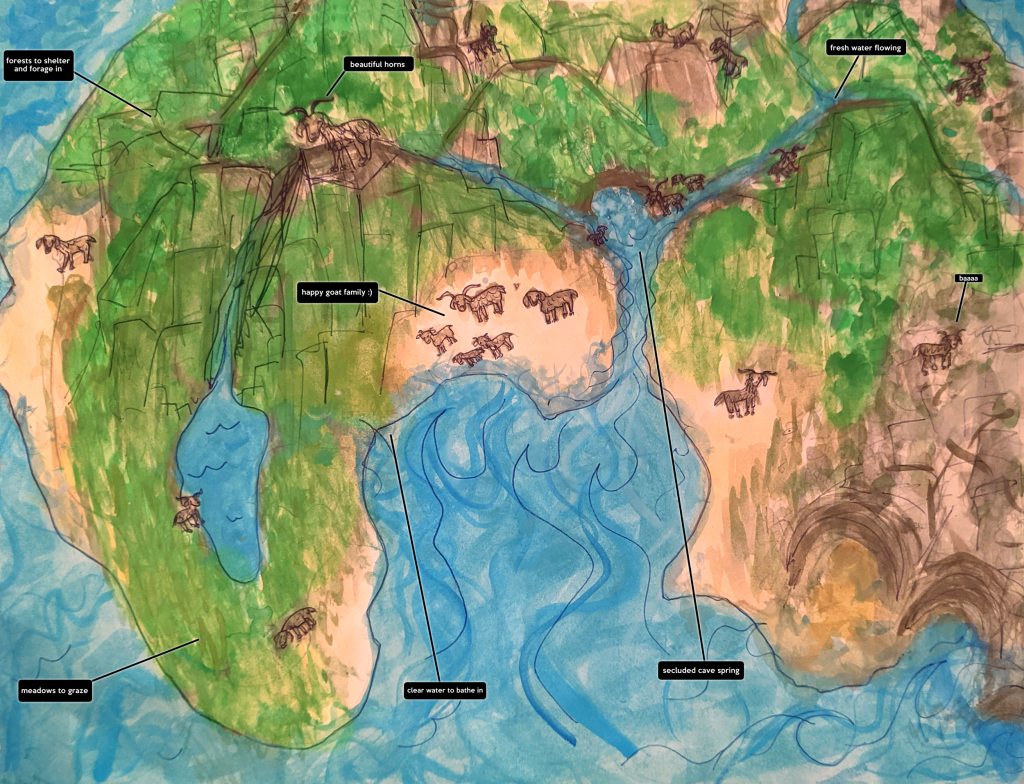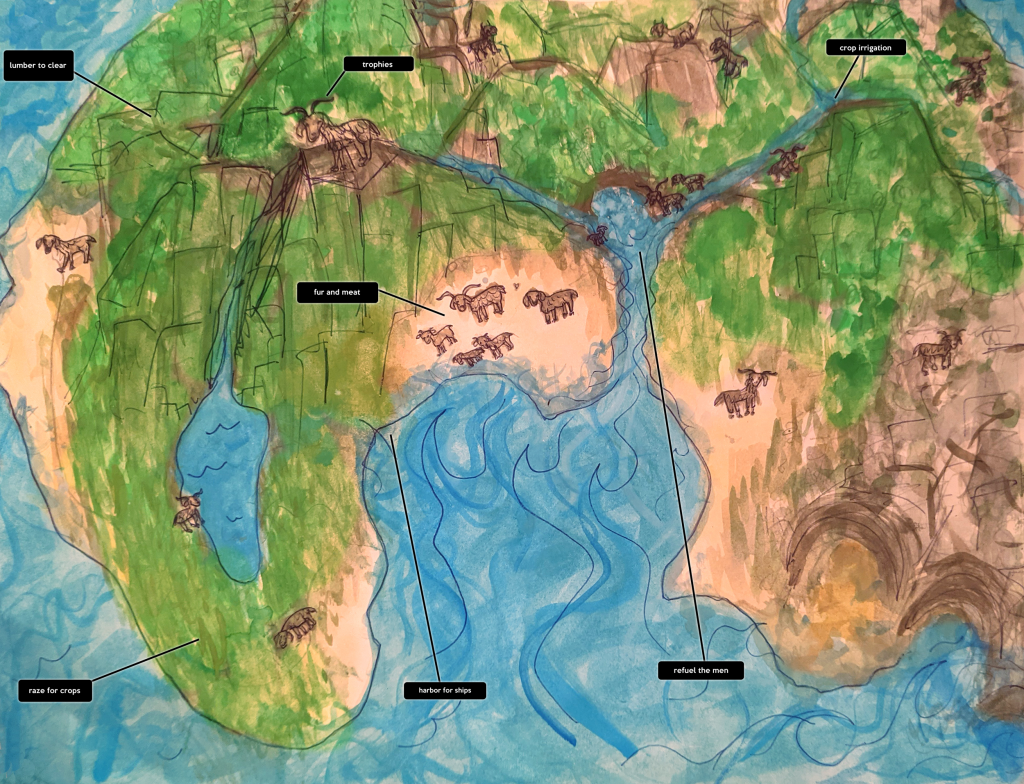32 Anatomy of Goat Island
Anatomy of Goat Island
by Miranda Mattlin
In Book IX of The Odyssey, Odysseus approaches Polyphemus and the island of the Cyclopes, and comes across a nearby island populated entirely by goats. The description of the island is that of a paradise, and Odysseus’s first and only instinct is to colonize it. I was drawn to the idea of goat island because it shows how even when there is no way for Odysseus to construe the island’s inhabitants as an enemy and justify his awful treatment of them, he still sees every aspect of the land and its happy, self-sufficient goats as something for him to take. I drew and colored in a rendition of what I imagined the goat island might look like, based off the description in the text and pictures of the island of Sardinia off the coast of Italy, then labelled it like an anatomical diagram or map from the perspective of the goats, and then again from the perspective of Odysseus. This helps me show how the gaze of Odysseus, in which much of The Odyssey is explicitly written via his recounted memories, is a gaze of taking, and taking advantage of. I do not intend to make a value judgement on the usage of natural resources in itself, only on the gaze with which Odysseus specifically views this island, to uplift a subaltern narrative of the land and creatures occupying the world Odysseus seemingly wants to conquer even as he wails about the importance of a homeland.
Both the goats and Odysseus’s men need to use the island’s resources to survive, but the goats graze peacefully on the open land while Odysseus sees the island purely as a wilderness to plough and sow, so that he and his men can take advantage of it. Odysseus seeks not to subsist off the land but to improve it, to take everything he can from it and transform its natural processes to suit his customs because he assumes he knows best. The beauty of the island is in its undisturbed wilderness, but Odysseus describes such undisturbed beauty to the Phaeacians with the express purpose of legitimizing his desire to take it for himself, and justifying the violence he may exact in the process – like victim-blaming the land for seeming attractive or innocent. He scoffs at the Cyclopes for never colonizing the lush, idyllic island, assuming it’s only their lack of ability to build boats that stops them from doing so. He appreciates the rich meadows only for their ability to support an orchard, the depth of the soil only for its optimal potential harvest yield, and the peaceful harbor only for its ability to steady a ship. His men kill several goats for food, enough that all of them can have their fill and maybe some leftover, and he does not care what may happen to the island after he has had his way with it.


Image Description: Two identical watercolor sketches of lush green island with bright blue waters, sandy beaches, and rocky mountains, all populated by varieties of goats. The first image has labels on parts of the island from the perspective of the goats, and the second image has those same parts of the island labelled from Odysseus’s perspective. The forest to shelter and forage in becomes lumber to clear, the meadow to graze becomes raze for crops, the beautiful goat horns become trophies, the happy goat family becomes fur and meat, the clear water to bathe in becomes a harbor for ships, the secluded cave spring becomes a refueling station for his men, and the flowing fresh water becomes crop irrigation.
Corresponding Quote from The Odyssey, Emily Wilson translation:
“With heavy hearts we sailed along and reached
the country of high-minded Cyclopes,
the mavericks. They put their trust in gods,
and do not plant their food from seed, nor plow,
and yet the barley, grain, and clustering wine-grapes 110
all flourish there, increased by rain from Zeus.
They hold no councils, have no common laws,
but live in caves on lofty mountaintops,
and each makes laws for his own wife and children,
without concern for what the others think.
A distance from this island is another,
across the water, slantways from the harbor,
level and thickly wooded. Countless goats
live there but people never visit it.
No hunters labor through its woods to scale 120
its hilly peaks. There are no flocks of sheep,
no fields of plowland—it is all untilled,
unsown and uninhabited by humans.
Only the bleating goats live there and graze.
Cyclopic people have no red-cheeked ships
and no shipwright among them who could build
boats, to enable them to row across
to other cities, as most people do,
crossing the sea to visit one another.
With boats they could have turned this island into 130
a fertile colony, with proper harvests.
By the gray shore there lie well-watered meadows,
where vines would never fail. There is flat land
for plowing, and abundant crops would grow
in the autumn; there is richness underground.
The harbor has good anchorage; there is
no need of anchor stones or ropes or cables.
The ships that come to shore there can remain
beached safely till the sailors wish to leave
and fair winds blow. Up by the harbor head 140
freshwater gushes down beneath the caves.
The poplars grow around it.”
